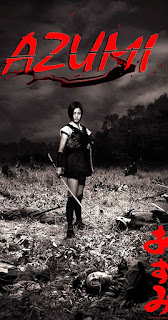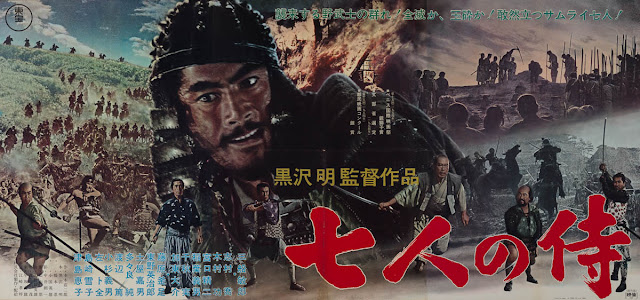Azumi (Dir Ryûhei Kitamura, 2h 22m, 2003)
Azumi is...an interesting film. In places, it is a bloody, visceral samurai epic, in which a young woman and her fellow assassins hunt down three warlords threatening to wreak war across Japan, with spectacular fight scenes and memorable villains. Yet, Ryûhei Kitamura's adaption of the Yū Koyama manga is a film with an identity crisis, for alongside the brutal samurai action is a goofy, comic, and often bizarre film, with Kitamura's hyperkinetic style often clashing against his setting-despite, or maybe due to this, Azumi is a spectacular film, with excellent performances, stunning fight scenes, and an enjoyably breakneck pace.
Beginning with the Tokugawa Shogunate, the film introduces three lords (Asano, Kato and Sanada), supporters of the previous shogun, who plan to rebel against Tokugawa. The shogun thus turns to samurai Jiji, to train assassins to defeat the trio, and the film cuts to the young Azumi, who is, along by several other children taken in and trained by Jiji, with the film neatly jumping ahead to her and her fellow assassins as young adults, in a neatly shot, and excellently choreographed fight scene which introduces all ten of the assassins, culminating with the reintroduction of Azumi (Aya Ueto).
Ueto's performance is, without a doubt, the best part of the film, capturing perfectly both the toughness of its heroine, and her femininity, and it is this conflict between the girl and the assassin that the film essentially hinges on. We see her struggle with this throughout the film, at one point attempting to leave the life of an assassin with another young woman, only to be pulled back into the life of an assassin to protect her, realising that this is the only thing that she knows. Elsewhere in the film, particularly in the colossally scaled finale, she is spectacularly ruthless, scything through hordes of fighters, and that Ueto manages to capture both of these elements of her heroine is nothing short of impressive.
Nowhere is this balance between the assassin and the girl better seen than in her reluctance, despite her orders from her master, to kill her friend; here, the film manages to capture the desperation of the five survivors, the camera practically clinging to the action as wounded fighters crawl across the floor, or tussle, whilst Kitamura's use of bloody violence, including arterial spray and brutal swordfights adds a sense of the brutality to the scene, and the shocking conclusion to this sequence, the remaining assassins standing in front of their burning former home.
With the assassins quickly dispatching Asano in a neatly brutal scene that juxtaposes the lord's naivety with a summarily nasty dispatch in which Asano is stabbed through a sheet and his supporters hacked down, so Kato turns to his general, Kanbei, and Kanbei's lieutenant, the ape-like Saru, to defend him. First, Kanbei manages to trick the five assassins into killing a double of Kato, and thus relaxing after having supposedly dispatched two of the three rebellious lords, before sending a bizarre trio of bandits to defeat them, leading to a mix-up between the teenage assassins and a troupe of travelling circus performers that are grimly dispatched.
And it is here that the film's bizarre comic vein begins to show its face; the trio of bandits are a surprisingly goofy trio, including a ninja-esque figure who manages, in his first scene on screen, to stab a hole through his hand in an arm wrestling competition with his brother, and even though the fight between them and the quintet of assassins is brutal, it's also surprisingly funny, the brutal scenes interspersed with witty one-liners, and a remarkably funny death for one of the trio. That the film manages to balance this comic element, dark as it is, and an otherwise relatively straightforward film is nothing short of a smartly done balancing act.
With Kanbei irritated at the failure of the trio, so he turns to dangerous and undeniable star of this film, Bijomaru. Played by Japanese actor, Joe Odagiri, Bijomaru is nothing short of a masterclass in high camp, twinned with a ruthless figure who relishes his fights against the assassins in a series of brutal, and visceral fights, beginning with the dispatch of Azumi's comrade, in a scene that shows how badly outmatched the assassins are against the crazed murderer, whose androgynous appearance, and all-white costume only adds to his outlandishness and dangerousness, utterly outmatching the hapless assassin and enjoying the fight and eventual death that he wreaks
With Bijomaru, and the forces that he, Kanbei and Saru have amassed whittling down the assassins to a vengeful Azumi, in a series of impressively visceral fight scenes, including one where one of the assassins fights his way to rescue his master only to be brought down and hacked to pieces, so the film pulls off its jaw dropping finale, a nigh twenty-minute fight scene in which Azumi cuts through hordes of men in a series of impressive stunts that includes the destruction of much of the fort, and leads to the most impressive fight scene of the film, as Azumi crosses blades with, and finally defeats, Bijomaru, in a satisfyingly brutal moment of closure.
Azumi, if nothing else, is an excellently made samurai movie, albeit one that belies its manga origins in an occasionally inconsistent tone. What it certainly is, as much as Kitamura's films are, is an enjoyably tough, bloody, and most of all, action-paced piece of cinema, supported by two excellent performances, a dark sense of humour, and a visceral drive.
Rating: Recommended

.jpg)

Comments
Post a Comment